

Argumentative Essay On Democracy Is Better Than Military Rule
The debate between democracy and military rule has long been a topic of contention in discussions about governance. In this essay, we will explore the advantages of democracy over military rule, focusing on representation, human rights, the rule of law, economic development, and peaceful transitions of power. Democracy, with its emphasis on citizen participation and protection of individual rights, has proven to be a better path to progress and prosperity for nations worldwide.
Table of Contents
Reasons Why Democracy Is Better Than Military Rule Essay
Representation and participation.
One of the fundamental pillars of democracy is representation and participation. In democratic societies, citizens have the opportunity to elect their leaders, granting them a voice in shaping policies that impact their lives. Elected representatives, who are accountable to the people, advocate for the interests of their constituents and secure various perspectives, are considered in decision-making processes. In contrast, military rule often leaves citizens without a voice, as a select group makes decisions of military leaders without the consent of the governed.
Protection of Human Rights
Democracies are characterized by a commitment to protecting individual rights and freedoms. Constitutional frameworks and independent judiciary systems in democratic nations ensure that basic human rights, such as freedom of speech, assembly, and expression, are upheld. These rights are essential for fostering an environment of open dialogue, debate, and progress. In contrast, military rule may impose restrictions on civil liberties, leading to censorship and oppression, stifling societal growth and development.
Rule of Law
The rule of law is a cornerstone of democratic governance. In a democracy, laws apply to all citizens equally, regardless of their social or political standing. This principle ensures that those in power are held accountable for their actions, promoting transparency and fairness. In military rule, the rule of law may be undermined, leading to arbitrary decision-making and a lack of checks and balances, which can result in abuse of power.
Economic Development
Empirical evidence suggests that democracies tend to experience higher levels of economic development compared to countries under military rule. The stability and predictability of democratic systems create a favorable environment for investment, innovation, and entrepreneurship. Additionally, democratic governments prioritize policies that foster economic growth, social welfare, and education, leading to better economic outcomes and improved living standards for citizens.
Peaceful Transitions of Power
One of the significant advantages of democracy is its ability to facilitate peaceful transitions of power through regular elections. In democratic nations, leaders are elected for a fixed term, and power is peacefully transferred to the winning candidate after each election cycle. This ensures political stability and reduces the risk of violent conflicts that can arise from power struggles in military regimes.
Challenges and Counterarguments
While democracy offers numerous benefits, it is essential to acknowledge its challenges and consider counterarguments. Democracies can face issues such as political polarization, bureaucratic inefficiencies, and the influence of money in politics. Furthermore, some argue that military rule can bring stability and decisive action in times of crisis. However, it is crucial to recognize that military rule often comes at the cost of human rights and undermines the principles of democratic governance.
In conclusion, democracy has proven to be a superior form of governance when compared to military rule. It ensures representation and citizen participation, protects human rights, upholds the rule of law, fosters economic development, and facilitates peaceful transitions of power. While it may face challenges, democracy remains the best path to progress and prosperity for nations worldwide. Embracing democracy’s core principles of inclusion, transparency, and accountability will continue to lead societies toward a brighter and more equitable future.

Hello! Welcome to my Blog StudyParagraphs.co. My name is Angelina. I am a college professor. I love reading writing for kids students. This blog is full with valuable knowledge for all class students. Thank you for reading my articles.
Related Posts:

Leave a Reply Cancel reply
Your email address will not be published. Required fields are marked *
Save my name, email, and website in this browser for the next time I comment.
Numbers, Facts and Trends Shaping Your World
Read our research on:
Full Topic List
Regions & Countries
- Publications
- Our Methods
- Short Reads
- Tools & Resources
Read Our Research On:
- Globally, Broad Support for Representative and Direct Democracy
- 2. Democracy widely supported, little backing for rule by strong leader or military
Table of Contents
- 1. Many unhappy with current political system
- Acknowledgments
- Methodology
- Appendix: Political categorization
Governance can take many forms: by elected representatives, through direct votes by citizens, by a strong leader, the military or those with particular expertise. Some form of democracy is the public’s preference.
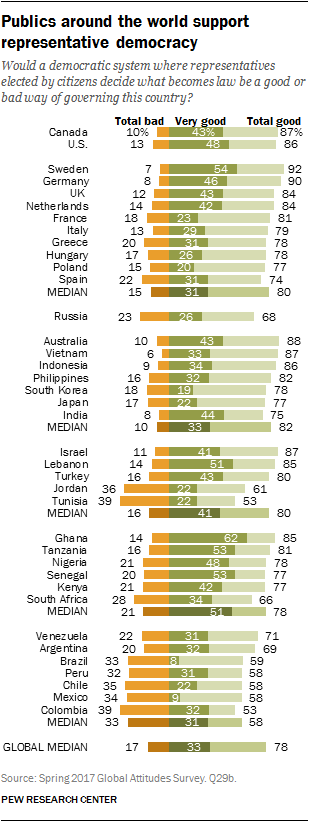
[a representative democracy]
A global median of 78% back government by elected representatives. But the intensity of this support varies significantly between nations. Roughly six-in-ten Ghanaians (62%), 54% of Swedes and 53% of Senegalese and Tanzanians hold the view that representative democracy is very good. Just 8% of Brazilians and 9% of Mexicans agree. The only countries where there is significantly strong opposition to representative democracy are Colombia (24% say it is very bad) and Tunisia (23% very bad).
In many countries, skepticism of representative democracy is tied to negative views about economic conditions. In 19 countries, people who say their national economies are in bad shape are less likely to believe representative democracy is good for the country.
In 23 nations, the belief that representative democracy is good is less common among people who think life is worse today than it was 50 years ago. In Spain, for example, just 63% of those who believe life is worse than before consider representative democracy a good thing for their country, compared with 80% who support representative democracy among those who say life is better than it was a half century ago.
Similarly, pessimism about the next generation is related to negative views about representative democracy. In roughly half the nations surveyed those who think today’s children will be worse off financially than their parents are less likely than others to say representative democracy is a good form of government. Among Mexicans who believe the next generation will be worse off, only 52% say representative democracy is good for the country. Backing for government by elected representatives is at 72% among those who say children will be better off than their parents.
Attitudes toward representative democracy are also associated with opinions about diversity. In more than a third of the nations surveyed those who think that having people of many different backgrounds – such as different ethnic groups, religions and races – makes their country a worse place to live are less likely than others to support government by elected representatives. In South Africa, a country with a troubled history of racial oppression and conflict, 73% of those who embrace diversity describe representative democracy as a good thing for their country; just 54% agree among those who say diversity makes South Africa a worse place to live.
Many publics want a direct say
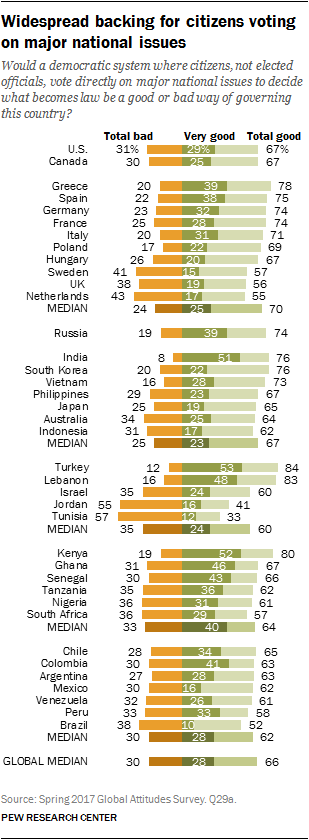
Direct democracy, a governing system where citizens, not elected officials, vote directly on major national issues, is supported by roughly two-thirds of the public around the world, with little difference in views between regions.
The strongest support for governing through referenda is found in Turkey (84%), where 53% of the public say it would be very good to have citizens vote on major national issues. Lebanon (83%) and Kenya (80%) also show broad support for direct democracy.
There is also strong backing for such governance in Japan (65%) even though the country has not had a referendum in the post-World War II era.
In the U.S., Germany and the Netherlands, people with a high school education or less are more likely than those with more than a high school education to support direct democracy. Such differences are small in the U.S. (6 percentage points) and Germany (8 points) but there is a 17-point differential in the Netherlands (62% of those with less educational attainment back direct democracy, but only 45% of those with more education agree).
In six of seven Latin American nations surveyed, those with a secondary school education or above are more supportive of direct democracy than those with less than a high school education. This educational divide is 16 points in Chile and 14 points in Argentina and Colombia. In each of these countries, those with less education are less likely to hold an opinion of direct democracy.
In Latin America, there is also a generation gap in views of direct democracy. In Brazil, Chile, Mexico and Venezuela, those ages 18 to 29 are more supportive than those ages 50 and older of having citizens, not elected officials, vote directly on issues of major national importance.
Notably, in the U.S. it is people ages 30 to 49 who are most likely (73%) to back referenda.
In other countries there are sharp divisions along religious or ethnic lines. In Israel it is Arabs (83%) more than Jews (54%) who favor direct democracy, and in Nigeria it is Muslims (70%) more than Christians (55%).
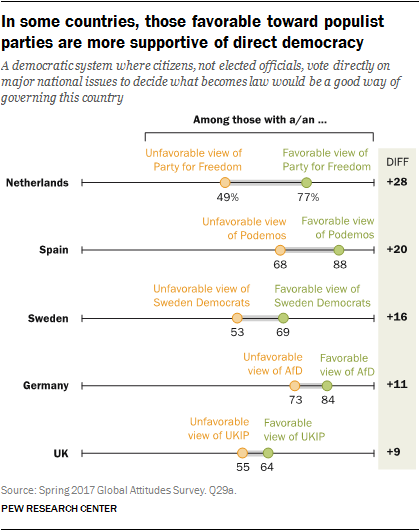
Supporters of some populist parties in Europe are particularly enthusiastic about direct democracy. In Spain, 88% of those who hold a favorable view of Podemos say citizens voting on national issues would be good for the country. In Germany, 84% of AfD backers agree, as do 77% of PVV supporters in the Netherlands.
Support for direct democracy can also be seen in other recent Pew Research Center findings in Europe. In the wake of the United Kingdom’s decision to leave the European Union, a median of just 18% in nine continental EU member states say they want their country to exit the EU. But 53% support holding a national vote on their own country’s EU membership.
And such support is particularly strong among backers of Euroskeptic populist parties, many of whom have promised their supporters a referendum on EU membership. (For more on European’s attitudes about staying in the EU, see Post-Brexit, Europeans More Favorable Toward EU .)
And in six of the nine continental European nations surveyed, strong majorities of those who believe that direct democracy is a very good form of governance support their own EU membership referendum.
Technocracy has its champions
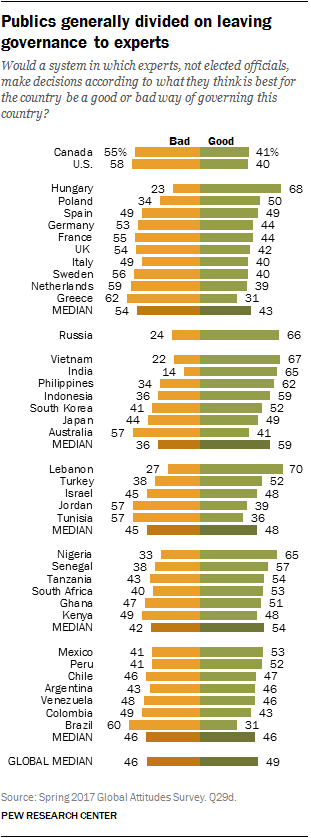
The value of expert opinion has been questioned in the eyes of the public in recent years. But when asked whether a governing system in which experts, not elected officials, make decisions would be a good or bad approach, publics around the world are divided: 49% say that would be a good idea, 46% think it would be a bad thing.
Europeans (a median of 43%) and Americans (40%) are the least supportive. But among Europeans, roughly two-thirds of Hungarians (68%) say leaving decision-making to experts would be a good way to govern.
Asian-Pacific publics generally back rule by experts, particularly people in Vietnam (67%), India (65%) and the Philippines (62%). Only Australians are notably wary: 57% say it would be a bad way to govern, and only 41% support governance by experts.
More than half of Africans surveyed also say governing by experts would be a good thing for their country. Nigerians (65%) are especially supportive. And it is Nigerian Muslims more than Christians who say this.
Young people in a number of advanced economies are particularly attracted to technocracy. In the U.S. the age gap is 10 percentage points – 46% of those ages 18 to 29 but only 36% of those ages 50 and older say it would be good if experts, not elected officials, made decisions. The young-old differential is even greater in Australia (19 points), Japan (18 points), the UK (14 points), Sweden (13 points) and Canada (13 points).
Some support for rule by strong leader
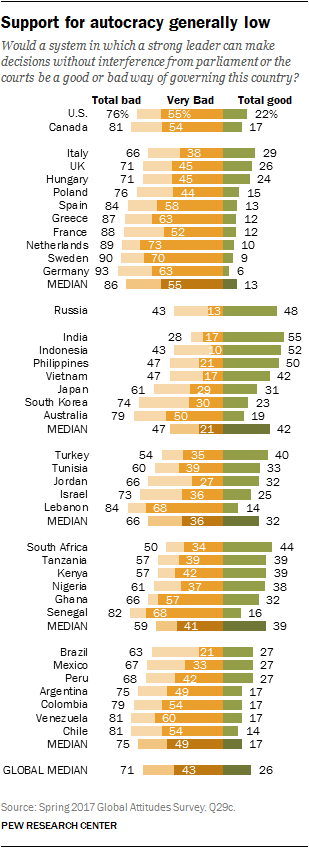
Rule by a strong leader is generally unpopular, though minorities of a substantial size back it. A global median of 26% say a system in which a strong leader can make decisions without interference from parliament or the courts would be a good way of governing. Roughly seven-in-ten (71%) say it would be a bad type of governance.
Opposition is particularly widespread in Europe (a median of 86% oppose rule by a strong leader), with strong opposition in Germany (93%), Sweden (90%) and the Netherlands (89%).
But autocracy is not universally opposed. Roughly four-in-ten Italians (43%) who have a favorable view of Forza Italia, the political party founded by former Italian Prime Minister Silvio Berlusconi, and a similar share of the British (42%) who favor UKIP say a strong leader making decisions would be good for their country. Nearly half of Russians (48%) back governance by a strong leader.
In Asia, 55% of Indians, 52% of Indonesians and 50% of Filipinos favor autocracy. Such support is particularly intense in India, where 27% very strongly back a strong leader.
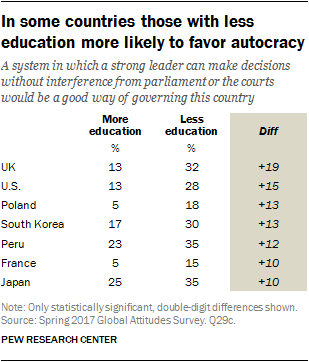
Public views of rule by a strong leader are relevant in countries that have experienced degrees of authoritarianism in recent years. Roughly eight-in-ten Venezuelans (81%) and 71% of Hungarians oppose a strong leader who makes decisions without interference of parliament or the courts.
Rule by a strong leader also appeals to older members of the public in some countries. More than a quarter of Hungarians (29%) and South Koreans (34%) ages 50 and older favor governance by a strong leader.
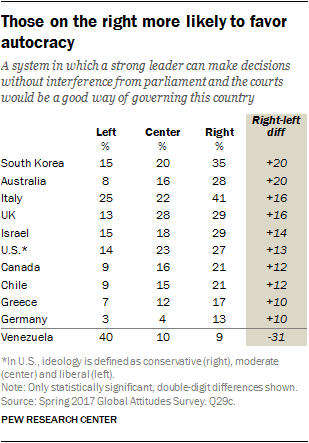
In advanced economies there is little overall backing for autocracy. But, where such support does exist, it is often people with a secondary education or below who are more likely than those with more education to favor autocratic rule. This educational divide is particularly wide in the UK (19 percentage points), the U.S. (15 points), Poland and South Korea (both 13 points).
In a number of nations there is a significant division of opinion about strong leaders based on ideology. Those who place themselves on the right of the ideological spectrum are more likely than those who place themselves on the left to say a strong leader making decisions would be a good way of governing. The ideological gap is 20 percentage points in South Korea and Australia and 16 points in Italy and the UK. Notably, in Venezuela, which has been ruled by populist, left-wing strongmen, those on the left are more supportive of autocratic rule than those on the right.
Significant minorities support military rule
There is minority support for a governing system in which the military rules the country: a median of 24% in the 38 nations surveyed. At least four-in-ten Africans (46%) and Asians (41%) see value in a government run by the generals and admirals.
The strongest backing is in Vietnam (70%), where the army has long played a pivotal role in governance in close collaboration with the Communist Party, especially in the 1960s and 70s during the war with the United States. Some of this may be nostalgia for the past: By two-to-one (46% to 23%) Vietnamese ages 50 and older are more likely than those ages 18 to 29 to say military rule would be very good for their country.
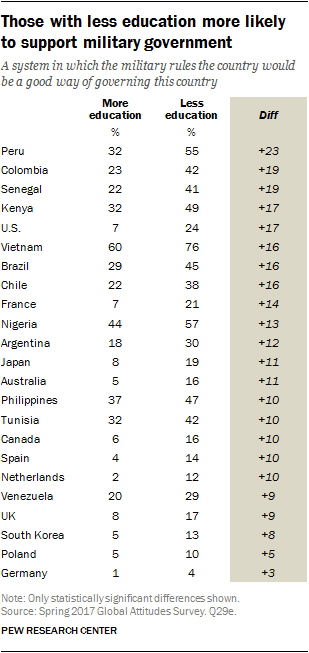
Notably, roughly half of both Indians (53%) and South Africans (52%), who live in nations that often hold themselves up as democratic exemplars for their regions, say military rule would be a good thing for their countries. But in these societies, older people (those ages 50 and older) are the least supportive of the army running the country, and they are the ones who either personally experienced the struggle to establish democratic rule or are the immediate descendants of those democratic pioneers. In South Africa, blacks (55%) more than whites (38%) also favor the military making governance decisions.
Only one-in-ten Europeans back military rule. But some on the populist right of the political spectrum voice such support. Nearly a third of those who hold a favorable view of the National Front in France (31%) say a governing system in which the military rules the country would be a good thing, as do nearly a quarter of those who favor UKIP in the United Kingdom (23%).
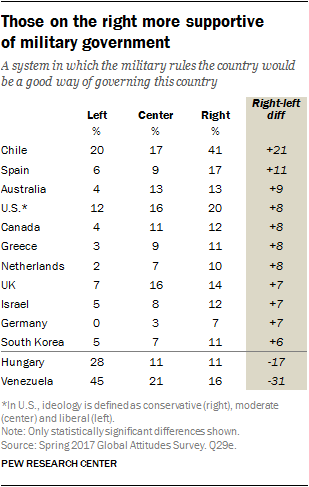
Support for a governing system in which the military rules the country enjoys backing among people with less education in at least half the countries surveyed, with some of the strongest support among those with less than a secondary education in Africa and Latin America.
More than half of Peruvians with less than a high school education (55%) prefer military rule. Only about a third (32%) of more educated Peruvians agree.
Particularly strong backing for military rule also exists among the less educated in Vietnam (76%), Nigeria (57%), Kenya (49%) and the Philippines (47%).
Notably, one-in-five of those ages 50 and older in the U.S. support military rule, as do roughly one-in-four Japanese (24%) ages 18 to 29.
Ideology also plays a role in public views of military rule. But it can cut both ways. In some countries, people on the right of the political spectrum are significantly more supportive of military governance than those on the left, especially in Chile. In Hungary and Venezuela, on the other hand, it is more likely to be individuals on the left who see value in military rule.
Sign up for our weekly newsletter
Fresh data delivery Saturday mornings
Sign up for The Briefing
Weekly updates on the world of news & information
- Authoritarianism
- Trust in Government
- Trust, Facts & Democracy
Support for democracy is strong in Hong Kong and Taiwan
Who likes authoritarianism, and how do they want to change their government, many across the globe are dissatisfied with how democracy is working, how countries around the world view democracy, military rule and other political systems, study on twins suggests our political beliefs may be hard-wired, most popular, report materials.
- Explore global opinions on political systems by country
- Spring 2017 Survey Data
901 E St. NW, Suite 300 Washington, DC 20004 USA (+1) 202-419-4300 | Main (+1) 202-857-8562 | Fax (+1) 202-419-4372 | Media Inquiries
Research Topics
- Email Newsletters
ABOUT PEW RESEARCH CENTER Pew Research Center is a nonpartisan fact tank that informs the public about the issues, attitudes and trends shaping the world. It conducts public opinion polling, demographic research, media content analysis and other empirical social science research. Pew Research Center does not take policy positions. It is a subsidiary of The Pew Charitable Trusts .
© 2024 Pew Research Center
Explore our publications and services.
University of michigan press.
Publishes award-winning books that advance humanities and social science fields, as well as English language teaching and regional resources.
Michigan Publishing Services
Assists the U-M community of faculty, staff, and students in achieving their publishing ambitions.
Deep Blue Repositories
Share and access research data, articles, chapters, dissertations and more produced by the U-M community.
A community-based, open source publishing platform that helps publishers present the full richness of their authors' research outputs in a durable, discoverable, accessible and flexible form. Developed by Michigan Publishing and University of Michigan Library.

- shopping_cart Cart
Browse Our Books
- See All Books
- Distributed Clients
Feature Selections
- New Releases
- Forthcoming
- Bestsellers
- Great Lakes
English Language Teaching
- Companion Websites
- Subject Index
- Resources for Teachers and Students
By Skill Area
- Academic Skills/EAP
- Teacher Training
For Authors
Prospective authors.
- Why Publish with Michigan?
- Open Access
- Our Publishing Program
- Submission Guidelines
Author's Guide
- Introduction
- Final Manuscript Preparation
- Production Process
- Marketing and Sales
- Guidelines for Indexing
For Instructors
- Exam Copies
- Desk Copies
For Librarians and Booksellers
- Our Ebook Collection
- Ordering Information for Booksellers
- Review Copies
Background and Contacts
- About the Press
- Customer Service
- Staff Directory
News and Information
- Conferences and Events
Policies and Requests
- Rights and Permissions
- Accessibility
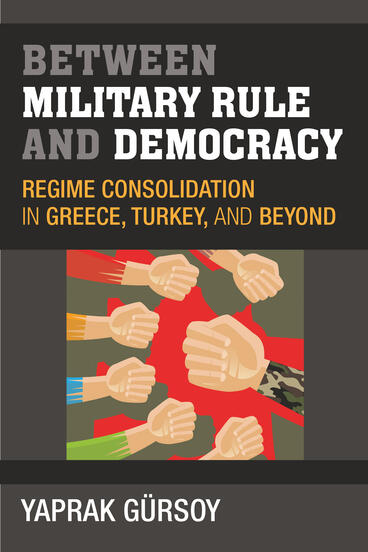
Between Military Rule and Democracy
Regime consolidation in greece, turkey, and beyond.
Examines military interventions in Greece, Turkey, Thailand, and Egypt, and the military’s role in authoritarian and democratic regimes
Look Inside
- Table of Contents
Description
Why do the armed forces sometimes intervene in politics via short-lived coups d’état, at other times establish or support authoritarian regimes, or in some cases come under the democratic control of civilians? To find answers, Yaprak Gürsoy examines four episodes of authoritarianism, six periods of democracy, and ten short-lived coups in Greece and Turkey, and then applies her resultant theory to four more recent military interventions in Thailand and Egypt.
Based on more than 150 interviews with Greek and Turkish elites, Gürsoy offers a detailed analysis of both countries from the interwar period to recent regime crises. She argues that officers, politicians, and businesspeople prefer democracy, authoritarianism, or short-lived coups depending on the degree of threat they perceive to their interests from each other and the lower classes. The power of elites relative to the opposition, determined in part by the coalitions they establish with each other, affects the success of military interventions and the consolidation of regimes.
With historical and theoretical depth, Between Military Rule and Democracy will interest students of regime change and civil-military relations in Greece, Turkey, Thailand, and Egypt, as well as in countries facing similar challenges to democratization.
Yaprak Gürsoy is Lecturer of Politics and International Relations at Aston University.
“ Between Military Rule and Democracy is a pioneering study in the sense that there exists no comparative-historical study of the same level of historical depth and theoretical sophistication which tries to uncover the complex trajectories of democratization and authoritarian reversals in the Southeastern periphery of Europe.” —Ziya Öniş, Koç University
“ Between Military Rule and Democracy goes beyond many of the other treatments of militaries in politics by making a well-supported argument concerning factors that influence the actions of militaries in various situations . . . It thus makes an interesting contribution to the literature on democratization and authoritarianism as well as providing very well-documented case studies of the actions of militaries in two countries where they have played an important role over time.” —Sharon Wolchik, George Washington University
News, Reviews, Interviews
Watch: Yaprak Gursoy book launch with the South East European Studies group at Oxford Link | 5/24/2017 Watch: Interview with Yaprak Gursoy with the South East European Studies group at Oxford Link | 4/19/2017


Write an Argumentative Essay on the Topic Military Rule is Better Than Civilian Rule

The ongoing debate surrounding often centers on the choice between military rule and civilian rule. Advocates for military rule assert its merits in terms of efficiency, discipline, and stability. While supporters of civilian rule emphasize democratic values and individual rights, it is important to explore both perspectives. Here we are going to write an argumentative essay on the topic military rule is better than civilian rule. This essay aims to present a simplified argument favoring military rule, with a focus on aspects that may resonate with students.
Efficiency and Discipline:
Military rule is frequently associated with efficiency and discipline. In a government led by the military, decisions are made swiftly, avoiding the prolonged debates common in civilian rule. This characteristic can lead to quicker problem-solving and a more efficient administration. To illustrate, consider a well-organized military operation compared to a smoothly executed school event where things are efficiently planned and carried out.
Stability and Order:
A key argument in favor of military rule is its ability to ensure stability and order. The disciplined structure within the military is believed to translate into a stable government capable of maintaining law and order effectively. Students can draw parallels to a well-managed classroom where rules are enforced, ensuring a peaceful learning environment.
National Security:
Proponents of military rule argue that it enhances national security, as the military is trained to protect the country from external threats. A government led by the military might prioritize national defense more effectively. This analogy can be related to a school setting where security measures are in place to ensure the safety of students and staff.
Decisive Leadership:
Military leaders are often perceived as decisive individuals capable of making tough choices for the greater good. In times of crisis, quick decision-making becomes crucial. Students can grasp this concept by comparing it to a student council that must make swift decisions during emergencies or challenging situations.
Corruption Control:
Advocates for military rule argue that it can effectively control corruption due to the strict code of conduct within military institutions. A government led by the military may enforce anti-corruption measures more rigorously. Students can understand this by drawing a parallel to a school environment where a strong administration ensures fair play and honesty among students.
While arguments in favor of military rule exist, it is essential to recognize that democracy and civilian rule offer unique advantages, including individual freedoms, representation, and government accountability to the people. This simplified perspective does not encompass the complexity of real-world governance. Striking a balance that ensures both efficiency and individual rights is crucial. As future leaders, students can contribute to building a society that values discipline, order, and democracy, acknowledging the merits of each system while working towards a harmonious coexistence.
Related Posts

Exploring Experimental Research Topics That Can Be Done At Home

100+ Engaging Debate Topics for High School: Shaping Future Leaders

Top Essential 20 Qualities of a Good Nurse

Exploring the 4 Types of Leadership Styles with Examples
Leave a comment cancel reply.
Your email address will not be published. Required fields are marked *
Save my name, email, and website in this browser for the next time I comment.
Democracy as the Best Form of Government Essay
- To find inspiration for your paper and overcome writer’s block
- As a source of information (ensure proper referencing)
- As a template for you assignment
A democracy is a form of governance characterized by power sharing. The implication of this is that all the citizens have an equal voice in the way a nation is governed. This often encompasses either direct or indirect involvement in lawmaking. “Democracy” can be a very delicate subject for any writer.
Throughout history, various scholars, including ancient philosophers, have had a divergent view on whether democracy is the best form of governance (Kelsen 3). Some of these arguments are discussed in this essay. Democracy appears to go hand in hand with national unity.
This is particularly true because this form of governance is all about people, and these people are working together towards attainment of national goals. The cohesiveness also results from the freedom prevailing in a democratic environment. Unity and liberty in a nation lay a fertile ground for economic and social growth (Weatherford 121).
In a democratic form of government, the entire citizenry is cushioned against exploitation and all form of abuse. As opposed to other governance approaches (for instance monarchy and dictatorship), democracy engages the people in decision-making processes. This ensures efficient delivery of basic services such as education, health care, and security.
Moreover, these services will be of high quality. Having people govern themselves significantly minimizes the risk of running a nation into chaos. In operational democracies, policies must undergo thorough scrutiny by many organs of government and stakeholders before they are made laws. The modalities of implementing the laws are also carefully determined.
In such a corporate system, it would be rare for all the involved people to be wrong. Therefore democracy protects a nation against the consequences of human errors. As a consequence of reduced possibility for human errors, people will experience a nation devoid of civil wars and strife. This atmosphere, in turn, perpetuates the general growth of a nation.
Democracy acts as a framework within which the law about the basic human rights operates (Barak 27). In a democratic environment, the law gives equal entitlement to the bill of rights with total disregard of race, ethnicity or economic class.
On the other hand, democracy may not be worth the high status it has been accorded for centuries by many schools of thought. Democracy gives an opportunity for all citizens to vote (Williamson 36). This can be technically hazardous to a nation. An average voter is not adequately equipped with the necessary information on the economic and political aspects of a nation.
The direct implication is that a fairly large percentage of voters will base their choice on limited and incorrect information. This situation can greatly impair development. Democratic approaches tend to slow down the process of policy-making and implementation (Dahl 49). This is due to the bureaucracies associated with democracy.
For example, it may take twelve months for parliament to debate over a bill, pass it into law and fully enforce it. In a dictatorial system, however, the same process would take utmost one day. For many years, democracy has been synonymous with political instability (Snell 18). The high turnover rate of governments comes with drastic changes in national and international policies.
New governments tend to attract much criticism from the media and non-governmental bodies. This criticism and alteration of international relations policies keep off foreign investors, something that can have immense economic implications to a nation.
The seemingly most feared danger of democracy relates to the basic rights of the minority. A case in point is the Netherlands. The Dutch parliament enacted a law against female genital mutilation. The Somali living in the Netherlands could not have a say in this because they are a small group.
In conclusion, the name a government gives itself is immaterial. Whether a government calls itself democratic, anarchy, monarchy, or dictatorial, the most important question should be “Are the people getting back what they deserve?”
Works Cited
Barak, Aharon. The Judge in a Democracy . New Jersey: Princeton University Press, 2006. Print.
Dahl, Robert. Democracy and its Critics. New Haven: Yale University Press, 1989. Print.
Kelsen, Hans. “Foundations of Democracy.” Ethics 66.1 (1955):1–101.
Snell, Daniel. Flight and Freedom in the Ancient Near East . Leiden: Brill Publishers, 2001. Print.
Weatherford, McIver. Indian givers: how the Indians of the America transformed the world . New York: Fawcett Columbine, 1988. Print.
Williamson, Thames. Problems in American Democracy . Montana: Kessinger Publishing, 2004. Print.
- Democracy Arguments For and Against
- Pluralism and Elitism
- The UK Parliament and Democratic Legislature
- Fascist Elements in Dictatorial Ideas of Mussolini and Hitler
- Francesca’s Kitchen Business in Netherlands and China
- Scholars on Postmodernism as Social Theory
- Ideology and Ideological State Apparatuses
- Analysis of Hugo Chavez and Muamar Gaddafi's Reign Through Machiavelli's Eye
- Machiavelli’s Views on Democratization and Their Relation to Modern Politics
- "The Corporation" by Joel Bakan
- Chicago (A-D)
- Chicago (N-B)
IvyPanda. (2020, March 14). Democracy as the Best Form of Government. https://ivypanda.com/essays/democracy-as-the-best-form-of-government/
"Democracy as the Best Form of Government." IvyPanda , 14 Mar. 2020, ivypanda.com/essays/democracy-as-the-best-form-of-government/.
IvyPanda . (2020) 'Democracy as the Best Form of Government'. 14 March.
IvyPanda . 2020. "Democracy as the Best Form of Government." March 14, 2020. https://ivypanda.com/essays/democracy-as-the-best-form-of-government/.
1. IvyPanda . "Democracy as the Best Form of Government." March 14, 2020. https://ivypanda.com/essays/democracy-as-the-best-form-of-government/.
Bibliography
IvyPanda . "Democracy as the Best Form of Government." March 14, 2020. https://ivypanda.com/essays/democracy-as-the-best-form-of-government/.
| Welcome, : / / / 43548 members, 38256 topics. : Thursday, 29th August 2024 |
» » » Debate: Civilian Rule Is Better Than Military Rule |
| by : On |
| Good morning, the chairman, the moderator the panel of judges, the time keeper, my co-debaters, and my attentive audience. The topic to be proposed this morning is “Civilian Rule is Better Than Military Rule”. First, one has to give the meanings of key words in this topic – Civilian and military Rule. Civilian rule can be defined as a type of governance undertaken by the civil society. It can also be referred to as government by the people’s representatives. Military rule on the other hand is governance by members of the armed forces. They usually force themselves on the people. Civilian rule is referred to as democratic while military rule is tagged autocratic. The process of choosing the representatives of the people is most often done through voting while the military come to power through another process called coup d’etat. At this juncture, I have to come out boldly by supporting the proposal, having these points to buttress my stance. One of the most important reasons why civilian rule is better is what we are doing today-debate. The freedom guaranteed all citizens to air their views. My opponents cannot deny the fact that you dare not publicly criticize a military regime. You will be rounded up by the state security agents if such happens. The process of becoming the peoples’ representative is another reason for my preference of civilian rule to military rule. All intending participants will come out to campaign. They will give highlights of what they wish to accomplish if they are voted for. Nigerians. The most important of all these is the choice. The opportunity given to the electorate to vote for the best candidate. In addition, civilian rulers tend to govern better than military rulers. This is simply because of the fear of reprimand by the people who elected them. The civilian rulers know clearly that should they fail to perform, re-election will be difficult. It may even spell doom for their political party if they are elected through the platform of a political party. Above all, they live amongst us, they begged us to vote for them and they are our people. It seems logical that they are easily accessible to us than any group of people who forced themselves on us. Moreover, there care checks and balances embedded in civilian rule to ensure smooth running of government. The legislative houses and the press oftentimes cry out to check the excesses of civilian rulers. My opponents can testify to the fact that there are no legislative houses during military regime. Again, the press is viewed by the military as their enemy, thus leading to the closure of medical houses and detention of journalists. In conclusion, I wish to state categorically that the armed forces are established to defend the territorial integrity of the nation against internal and external aggression. They should face their job rather than rule.
Life is good Click to share on Facebook (Opens in new window) Click to share on WhatsApp (Opens in new window) Click to share on Twitter (Opens in new window) Click to share on Telegram (Opens in new window) Click to share on LinkedIn (Opens in new window) Click to share on Reddit (Opens in new window) Click to share on Tumblr (Opens in new window) Click to share on Pinterest (Opens in new window) Click to print (Opens in new window) You must or to post a comment. |
| Sections: - Copyright @ 2016 - 2024 . All rights reserved. See . DMCA . : Every member is for that he/she or on |
Privacy Overview
Necessary cookies are absolutely essential for the website to function properly. This category only includes cookies that ensures basic functionalities and security features of the website. These cookies do not store any personal information.
Any cookies that may not be particularly necessary for the website to function and is used specifically to collect user personal data via analytics, ads, other embedded contents are termed as non-necessary cookies. It is mandatory to procure user consent prior to running these cookies on your website.

DEBATE TOPIC: 10 Reasons Why Civilian Rule is Better than Military Rule ( Support and oppose the motion)
Write an argumentative essay on civilian rule is better than military rule.
Explore the debate on whether civilian rule is better than military rule . This article provides insights into the advantages of civilian governance, backed by expert opinions and historical examples.
Civilian rule and military rule are two contrasting forms of governance that have shaped the course of history and politics. The debate surrounding the effectiveness and suitability of these forms of rule has been ongoing for decades. In this article, we delve into the reasons why civilian rule is considered superior to military rule.
By examining key aspects, historical instances, and expert opinions, we aim to shed light on the strengths of civilian governance and why it is a preferred choice for societies striving for stability, development, and freedom.
FREE DOWNLOAD NOW
Debate on civilian rule is better than military rule
10 reasons why civilian rule is better than military rule
Civilian rule is a fundamental aspect of democratic governance, and it has several advantages over military rule. Here are 10 reasons why civilian rule is better than military rule:
- Accountability : Civilian rule ensures that elected officials are accountable to the people, as they are chosen through free and fair elections. This accountability mechanism is absent in military rule, where the military leadership is not directly accountable to the public
- Civilian control of the military : Civilian rule allows for the establishment of a clear chain of command, with civilians in control of the military. This ensures that the military is subordinate to the larger purposes of the nation, rather than the other way around
- Protection of human rights : Civilian rule is more likely to protect human rights and uphold the rule of law, as it is based on democratic principles and the protection of individual freedoms
- Economic development : Civilian rule is more conducive to economic development, as it fosters a stable political environment and encourages investment and growth
- Peaceful transfer of power : Civilian rule allows for a peaceful transfer of power through elections, ensuring that political change occurs through democratic means rather than through force or violence
- Respect for international law : Civilian rule is more likely to respect international law and cooperate with other nations, as it is based on diplomacy and cooperation rather than force and coercion
- Promotion of democracy : Civilian rule promotes the spread of democracy and democratic values, as it demonstrates the benefits of democratic governance and encourages other nations to adopt similar systems
- Protection of minority rights : Civilian rule is more likely to protect the rights of minority groups, as it is based on the protection of individual freedoms and the promotion of diversity
- Reduction of corruption : Civilian rule is more likely to reduce corruption, as it promotes transparency and accountability in government
- Promotion of peace and stability : Civilian rule is more likely to promote peace and stability, as it fosters a stable political environment and encourages dialogue and compromise rather than force and coercion.
- JAMB Regularization for NYSC Registration & Mobilization 2024 Batch A, B and C PCMs
- How To Contact JAMB For Complaints, Inquiries and Other issues
DEBATE TOPIC: Civilian Rule is Better than Military Rule
Civilian rule refers to a government led by individuals who are not affiliated with the military. It is characterized by a focus on democracy, human rights, and the rule of law. Military rule, on the other hand, involves the direct control of a nation by the armed forces. While both forms of governance have been prevalent in various parts of the world, there are compelling reasons why civilian rule is widely regarded as the superior option.
Advantages of Civilian Rule
Democratic principles and representation.
Civilian rule inherently promotes democratic principles, ensuring that the government is accountable to the people it governs. Elected officials represent the interests of the citizens, creating a system where policies and decisions are made with the welfare of the populace in mind. This democratic process encourages transparency, participation, and a sense of ownership among citizens.
Protection of Human Rights
Under civilian rule, the protection of human rights is a fundamental priority. Constitutions and legal frameworks are designed to safeguard individual freedoms and prevent abuse of power. This commitment to human rights fosters an environment of equality and justice, allowing citizens to live without fear of oppression.
Sustainable Socioeconomic Development
Civilian governments are often better equipped to focus on long-term socioeconomic development. Policies can be formulated and executed based on comprehensive assessments of the nation’s needs and resources. Moreover, civilian rule promotes a stable environment that attracts foreign investments, encourages innovation, and supports economic growth.
Peaceful Conflict Resolution
Civilian governments emphasize diplomacy and negotiation in resolving conflicts, both domestically and internationally. Open dialogue and peaceful negotiations are preferred methods for resolving disputes, reducing the likelihood of armed conflicts that can arise under military rule.
Strengthening International Relations
Civilian rule tends to foster better diplomatic relations with other countries. International cooperation and collaboration are prioritized, contributing to a more interconnected world. Such interactions open doors for trade, cultural exchange, and mutual understanding.
- APPLY: Farleigh Dickinson University, USA degree scholarship, 2024 (Up to $24,000 every year)
Historical Examples of Successful Civilian Rule
The united states: a beacon of democracy.
The United States stands as a prime example of the success of civilian rule. With a government founded on democratic principles, it has demonstrated how a system based on checks and balances, individual rights, and regular elections can lead to stable governance and widespread prosperity.
South Korea: A Transition to Democracy
South Korea’s transition from military rule to civilian rule marked a turning point in its history. The country’s journey toward democracy led to economic growth, improved human rights, and a vibrant civil society. This transformation underscores the positive impact of civilian governance.
- APPLY: NNPC/SNEPCo University Undergraduate degree Scholarship
India: Diversity and Democracy
India, with its diverse population and complex social fabric, has embraced civilian rule since its independence. Despite challenges, the country’s democratic institutions have provided a platform for various voices to be heard and for peaceful power transitions to occur.
Expert Opinions on Civilian Rule
Renowned political scholars and experts overwhelmingly advocate for civilian rule as the preferred form of governance. Dr. Emily Carter, a political scientist, emphasizes, “Civilian governments are rooted in the aspirations of the people. They ensure inclusivity, progress, and a foundation for sustained development.”
- YABATECH Change of Course Form 2024: How To do It?
FAQs (Civilian Rule is Better than Military Rule )
Q: Can military rule bring stability in times of crisis? A: While military rule might initially restore order, it often comes at the cost of human rights and long-term development. Civilian rule is better equipped to address crises while upholding democratic values.
Q: Are there instances where military rule led to positive outcomes? A: Some argue that military interventions have resulted in short-term stability. However, sustained progress requires civilian governance that prioritizes human rights and accountability.
Q: How does civilian rule prevent abuse of power? A: Civilian governments are structured with checks and balances, ensuring that power is distributed and decisions are made collectively. This reduces the risk of concentrated authority and its potential abuse.
Q: What role does civilian rule play in economic growth? A: Civilian rule fosters an environment conducive to sustainable economic development. Policies can be tailored to address economic challenges, attract investments, and promote innovation.
Q: Can military rule effectively handle diplomatic relations? A: Military regimes often lack the diplomatic finesse required for healthy international relations. Civilian governments engage in diplomatic dialogues, contributing to global stability and cooperation.
Q: Are there risks associated with civilian rule? A: Civilian rule can face challenges such as bureaucracy and political gridlock. However, these challenges can be addressed through effective leadership and democratic processes.
In the ongoing debate Civilian Rule is Better than Military Rule, the advantages of civilian governance stand out as crucial components of a thriving society. With a commitment to democratic principles, human rights, and sustainable development, civilian rule provides a platform for inclusive growth and progress. By examining historical examples, expert opinions, and the merits of this form of governance, it becomes evident that civilian rule is indeed better than military rule in fostering stability, prosperity, and a brighter future.
Leave a Comment Cancel reply
Save my name, email, and website in this browser for the next time I comment.
This site uses Akismet to reduce spam. Learn how your comment data is processed .
Is Military Rule Better Than The Civilian Rule Or Vice-Versa?
This article examines whether military rule is better than the civilian rule and vice-versa. It provides the advantages of each system of government and gives room for readers to build on any of the points highlighted.
Democratic Government
Democracy is a form of government in which all eligible citizens have an equal say in the decisions that affect their lives. Democracy allows people to participate equally—either directly or through elected representatives—in the laws’ proposal, development, and creation. i.e., A democratic government is ruled by civilians, usually elected by the people. Democracy is ruled by the constitution and reign of civil laws, which are reasonably justifiable in a democratic society with civilians exercising all legislative, executive, and judicial powers.
A democratic government contrasts two forms of government where power is either held by one, as in a monarchy, or where power is held by a small number of individuals, as in an oligarchy or aristocracy. Nevertheless, these oppositions, inherited from Greek philosophy, are now ambiguous because contemporary governments have mixed democratic, oligarchic, and monarchic elements. Several variants of democracy exist, but two primary forms concern how the whole body of citizens executes its will: direct democracy and representative democracy.
Read: Is democracy the best form of government?
Military Government
A military government is ruled by the armed forces, who do not come to power through election, but by force of arms. A military regime is a process, procedure, or system with expertise, adapted and rooted in war and combat. It is a system rooted in martial law and forces. It is also a system that demands obedience always and, in its purest essence, makes no room for debate and opposition.
Some of the features of military rule include Suspension of the constitution, absence of an election, use of decrees and edicts, lack of respect for fundamental human rights, no checks and balances, centralized form of government, no periodic election, etc.
Read: Causes and remedies to indiscipline in schools
Which is better?
Below are the advantages of civilian rule and military rule. Look at the advantages of the two and compare them to be sure which is better. Each of them has its cons and that must be considered too. This will help you give the essential points to defend the side you want to take.
Civilian Rule
- There are ways to resolve different views and conflicts peacefully.
- It is a government by the people and for the people
- Respect for human dignity.
- The freedom to act, speak, and think freely (as long as it does not stop others from doing the same).
- Equality before the law.
- Safe and secure community.
- It is a system of government that is efficient, transparent, responsive, and accountable to citizens.
- Ability to hold elected representatives accountable.
- Opposition and criticism are tolerated.
Military Rule
- The military has protocol and structure.
- Protection of life and property is ensured in a military regime.
- Decision-making is faster in military regimes than in civilian.
- It instills discipline and brings about order and corporate living among people in society.
- Control of corruption
- It is cost-effective. Since the election is not conducted, billions spent on this process are avoided.
- There is respect for authority
- Criminal activities are minimal. Martial law can quickly illuminate all criminals.
- Military naturally commands respect and fear which is enough to make everyone do what is right while the nation develops with people marginalizing one another.
Related posts:
- Nigerian Military School JS1 Application Form 2024/2025
- Nigerian Military School (NMS) Admission List 2023/2024
- Nigerian Military School (NMS) Zaria School Fees 2023/2024
- How to gain admission into Obafemi Awolowo University
- How to know the type of course to study in the university
Bolarinwa Olajire
Leave a reply.
Your email address will not be published. Required fields are marked *

IMAGES
VIDEO
COMMENTS
In this essay, we will explore the advantages of democracy over military rule, focusing on representation, human rights, the rule of law, economic development, and peaceful transitions of power.
The military rule works better than democracy during emergencies and life-or-death situations. A soldier can’t afford to sit around taking a vote when the enemy is shooting. Likewise, democracy works best during peace because civil society is fairer when not ruled by tyrants.
Notably, one-in-five of those ages 50 and older in the U.S. support military rule, as do roughly one-in-four Japanese (24%) ages 18 to 29. Ideology also plays a role in public views of military rule. But it can cut both ways.
With historical and theoretical depth, Between Military Rule and Democracy will interest students of regime change and civil-military relations in Greece, Turkey, Thailand, and Egypt, as well as in countries facing similar challenges to democratization.
While arguments in favor of military rule exist, it is essential to recognize that democracy and civilian rule offer unique advantages, including individual freedoms, representation, and government accountability to the people.
This essay examines what different philosophers have had to argue both for and against democracy. Arguments for Democracy. One of the arguments is that democracy is important because it can be embraced and made deliberative. This implies that deliberation of a dialogical nature is vital to the democratic society.
In a democratic form of government, the entire citizenry is cushioned against exploitation and all form of abuse. As opposed to other governance approaches (for instance monarchy and dictatorship), democracy engages the people in decision-making processes.
Civilian rule can be defined as a type of governance undertaken by the civil society. It can also be referred to as government by the people’s representatives. Military rule on the other hand is governance by members of the armed forces. They usually force themselves on the people.
write an argumentative essay on civilian rule is better than military rule. Explore the debate on whether civilian rule is better than military rule. This article provides insights into the advantages of civilian governance, backed by expert opinions and historical examples.
This article examines whether military rule is better than the civilian rule and vice-versa. It provides the advantages of each system of government and gives room for readers to build on any of the points highlighted.